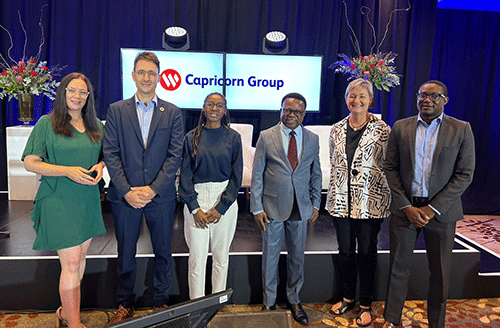New generation reporting took centre- stage this week when the Capricorn Group, in partnership with GreymatterFinch, hosted another investor relations workshop. The event, held yesterday in Windhoek, was attended by players from various sectors of the Namibian economy, including listed companies on the Namibian Stock Exchange, private firms and state-owned entities.
Capricorn Group CEO David Nuyoma emphasised that the new integrated reporting evolution is driven by the increasing demand for transparency and accountability.
“Transparency and accountability are crucial in our journey to bring about positive change. We should take this opportunity to explore how we can enhance our Integrated Reporting, share insights, challenge assumptions and work together to contribute to the narrative of a sustainable future,” he stated in his welcoming remarks.
“Capricorn Group’s own Integrated Reporting journey started in 2016 when we published our first Integrated Annual Report as part of our commitment to sound corporate governance, transparency and best practice. Since then, we have matured and evolved our reporting to ensure that we meet the needs of our stakeholders, whose information needs are changing, calling for more transparency and data on non-financial disclosures.”
During the workshop, a distinguished panel of speakers and presenters from various sectors shared their insights and experiences on different topics related to changes in the reporting landscape, and new perspectives on the role of boards in reporting.
Nuyoma urged the workshop attendees to actively participate in the ongoing transition to integrate and embed Environmental, Social and Governance (ESG) goals and performance into mainstream reporting.
“Our responsibility as organisations is to pave the way for a sustainable future that can last for generations to come. As we gather here today, we are not just representatives of our respective organisations, but we are also entrusted with the task of being stewards of collective responsibility to shape a future that is environmentally-friendly, socially equitable and economically resilient,” he added.
“That is why our theme for this morning is New Generation Reporting. It alludes to the notable changes and significant shift occurring in the dynamic corporate reporting environment, characterised by a growing demand for new and insightful information, especially in sustainability disclosures.”
While sharing her insights on the topic of developing a sustainability approach by using examples from the Johannesburg Stock Exchange (JSE), Loshni Naidoo, chief sustainability officer at the JSE, said markets are a powerful force for good in achieving the aims of supporting and driving sustainable value-creation.
“The JSE, as a leader in sustainability in emerging markets, recognises the importance of integrating the long-term perspective into financial markets to reduce socio-economic and physical risks, and contribute to enhanced financial stability and a low carbon economy through a just transition”.
Hymli Krige, a reporting strategist at GreymatterFinch, spoke about the evolving role of corporate boards, especially considering increased investor attention on ESG matters, and the ever-changing global sustainability reporting standards. During her presentation, Annie de Beer, a Content Creator at GreymatterFinch, discussed the evolution of disclosure from reporting to broader digital platforms.
Capricorn Group’s head of sustainability Ruan Bestbier moderated the panel discussion on future-fit sustainability reporting and disclosure.
He was joined by ESG Analyst at the Government Institutions Pension Fund (GIPF), Emilie Iyambo, financial director at Gondwana Collection Jaco Visser, and Robin Hollmann, a senior manager in Deloitte Africa’s sustainability team.
The highly-experienced panellists shared diverse perspectives and insights on sustainability reporting and strategies.


